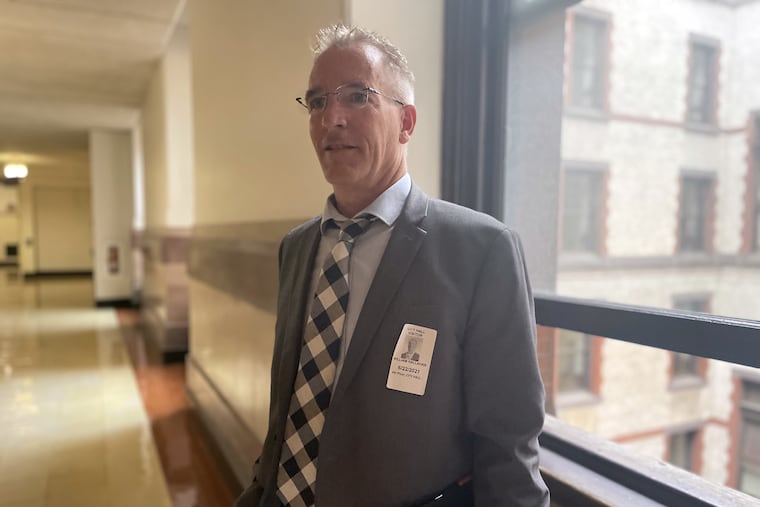A founder’s family is furious at Philly’s archdiocese for closing Hallahan high school: ‘They milked Mary for every cent’
“The Archdiocese is breaking an agreement with Mary,” Mary Hallahan McMichan's great-nephew said. “What they’re doing is downright dirty.”

Mary Hallahan McMichan was a woman before her time: an astute businessperson, an architect of her family’s fortune, a philanthropist who demanded women have the right to a robust education.
After McMichan’s oldest brother, John W. Hallahan, died in 1907, leaving the bulk of his estate to her, she split the money among the family. But she also went out on a limb: She mortgaged her own properties and donated $100,000, which would be about $3 million today, for the Archdiocese of Philadelphia to build a school for girls.
McMichan called for the school — which rose steps from the Cathedral Basilica of SS. Peter and Paul in Center City and opened in 1911 — to be operated in perpetuity.
But after educating Philadelphia girls for 110 years, Hallahan closed this month after the archdiocese said shrinking enrollment and rocky finances made continued operation of the nation’s oldest diocesan all-girls high school impossible.
Bill Hallahan, McMichan’s great-nephew, is devastated. And angry.
“The archdiocese is breaking an agreement with Mary,” Hallahan said in an interview last week. “What they’re doing is downright dirty.”
Kenneth Gavin, an archdiocese spokesperson, said, “Continued operations would have accelerated tuition increases to unaffordable levels and jeopardized our ability to provide the diverse academic and extracurricular offerings our families deserve.”
“Every potential alternative to closure was considered, but none were viable,” Gavin said in a statement.
Bill Hallahan sat in a City Hall courtroom last week as a judge lifted a temporary injunction blocking the archdiocese from selling the building that bears his family’s name. He vowed to continue fighting to reopen the school that was so important to McMichan.
He now supports a move by the Friends of Hallahan, a group of alumni and supporters organized this year, to reopen it outside of church control.
Growing up Catholic in Philadelphia, Hallahan knew his relatives held a special place in local church history.
» READ MORE: Advocates for reopening the Hallahan school were dealt a legal setback but vow to ‘find a way’
John W. Hallahan ran a successful shoe store in Philadelphia, but it was his youngest sister, Mary, who persuaded him to invest in real estate. She was his “advisor and executive” on every transaction, according to a 1951 account by the American Catholic Historical Society.
“Mary was the brains behind John W. Hallahan,” Bill Hallahan said.
After John’s death, McMichan fought with several family members who didn’t want a share of the inheritance going to the church — one brother went so far as to formally raise objections with Archbishop Edmund Prendergast.
But McMichan was both devout and dedicated to the idea that Catholic girls needed better educations. The archdiocese had opened Roman Catholic High School for boys in 1890, but it offered no similar option for young women.
“Mary knew that girls were not uplifted at all,” said Bill Hallahan, who grew up in Philadelphia and now lives in Montgomery County.
She mortgaged her personal assets, over her family’s objections.
Prendergast laid the cornerstone on Oct. 1, 1911; McMichan received a silver spade and trowel to mark the occasion.
The school eventually became “the keystone for high school education for Catholic girls,” according to the historical society account, which noted that a high school system that permitted girls’ education “rests upon the vision, sacrifice, generosity and decision” of McMichan.
McMichan was deeply involved in the school until her death in 1925. She helped students whose families had fallen on hard times, and once paid to have an elevator installed when she saw an elderly nun struggle to attend Mass in the school auditorium. McMichan also paid for the first Catholic hospital in the Philippines.
The archdiocese received the remainder of McMichan’s estate in 1976, after her daughter died.
Gavin, the archdiocese spokesperson, said what’s left of that money is “part of the funds which would be used to benefit Hallahan students over the next three years.”
Bill Hallahan, who met with Archbishop Nelson J. Pérez after the closure was announced, said his confidence in the church is gone.
“They milked Mary for every cent she had,” Hallahan said. “I have no faith in them at all anymore — they’re not even taking into consideration the history of what this woman did.”
» READ MORE: Hallahan is closed, but supporters have plans for a new school as legal battles swirl.
Philadelphia Orphans’ Court Judge Sheila Woods-Skipper ruled Tuesday that the Friends of Hallahan has no legal standing to demand an accounting of how funds donated by McMichan and others were distributed.
J. Conor Corcoran, the group’s lawyer, said he will refile court papers against the archdiocese on behalf of a larger group, including a current Hallahan student and parent. Corcoran said he hopes to get Friends of Hallahan named trustee of the school and permitted to run it independent of the archdiocese.
Bill Hallahan will be watching closely.
He’s particularly angry that the church, in a cease-and-desist letter to Friends of Hallahan, said it retains the right to the Hallahan name and legacy.
“That’s my name,” Hallahan said. “They don’t own that.”